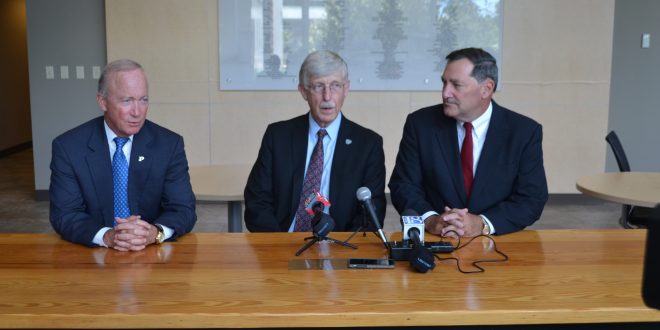West Lafayette, Ind. — Today, U.S. Senator Joe Donnelly joined Purdue University President Mitch Daniels in welcoming National Institutes of Health (NIH) Director Francis S. Collins, M.D., Ph.D., to West Lafayette. Donnelly, Daniels, and Collins toured Purdue research laboratories and received an update on Zika virus research happening on campus. Collins visited Purdue following Donnelly’s invitation.
Donnelly said, “It was important for me to invite Director Collins to visit Purdue, so he could see the incredible work being done by Hoosier students and researchers who are at the forefront of life-saving scientific innovation and discovery. There is exciting progress happening here, including a breakthrough to better understand the Zika virus and other discoveries. Purdue is an example of how smart, effective investments by the National Institutes of Health play a role in helping us better understand diseases and find new treatments and cures that can make a difference for Hoosiers and Americans across the country.”
Daniels said, “We are very grateful to Sen. Donnelly for arranging this important visit. Dr. Collins’ long tenure has come at an important time for the NIH, and his strong leadership has been critical in optimizing resources to advance the frontiers of scientific research.”
Collins said, “I’m grateful to Senator Donnelly for hosting me here at Purdue University today, and especially for his staunch support for NIH and biomedical research. It was exciting to see some of the remarkable work that NIH supports at Purdue, and to sense the enthusiasm of the many young scientists I had the pleasure of meeting.”
Earlier this year, researchers in a Purdue lab discovered the structure of Zika, marking a significant step forward in understanding the virus. Purdue University received federal grant funding this year to step up research efforts on the Zika virus. Donnelly voted in favor of moving forward with legislation to fund more research to combat the Zika virus earlier this summer.
NIH is the nation’s research agency, investing important resources each year in medical research to improve the health of all Americans. In the 2015 Fiscal Year, Indiana researchers won $214.5 million in NIH awards, supporting more than 3,900 jobs. Purdue University made a commitment this year to invest more than $250 million of its own funding into life sciences research over the next five years as a way to improve the quality of life for Hoosiers and to support Indiana’s burgeoning life sciences sector. Donnelly has advocated for robust NIH funding and investments in medical innovation.






